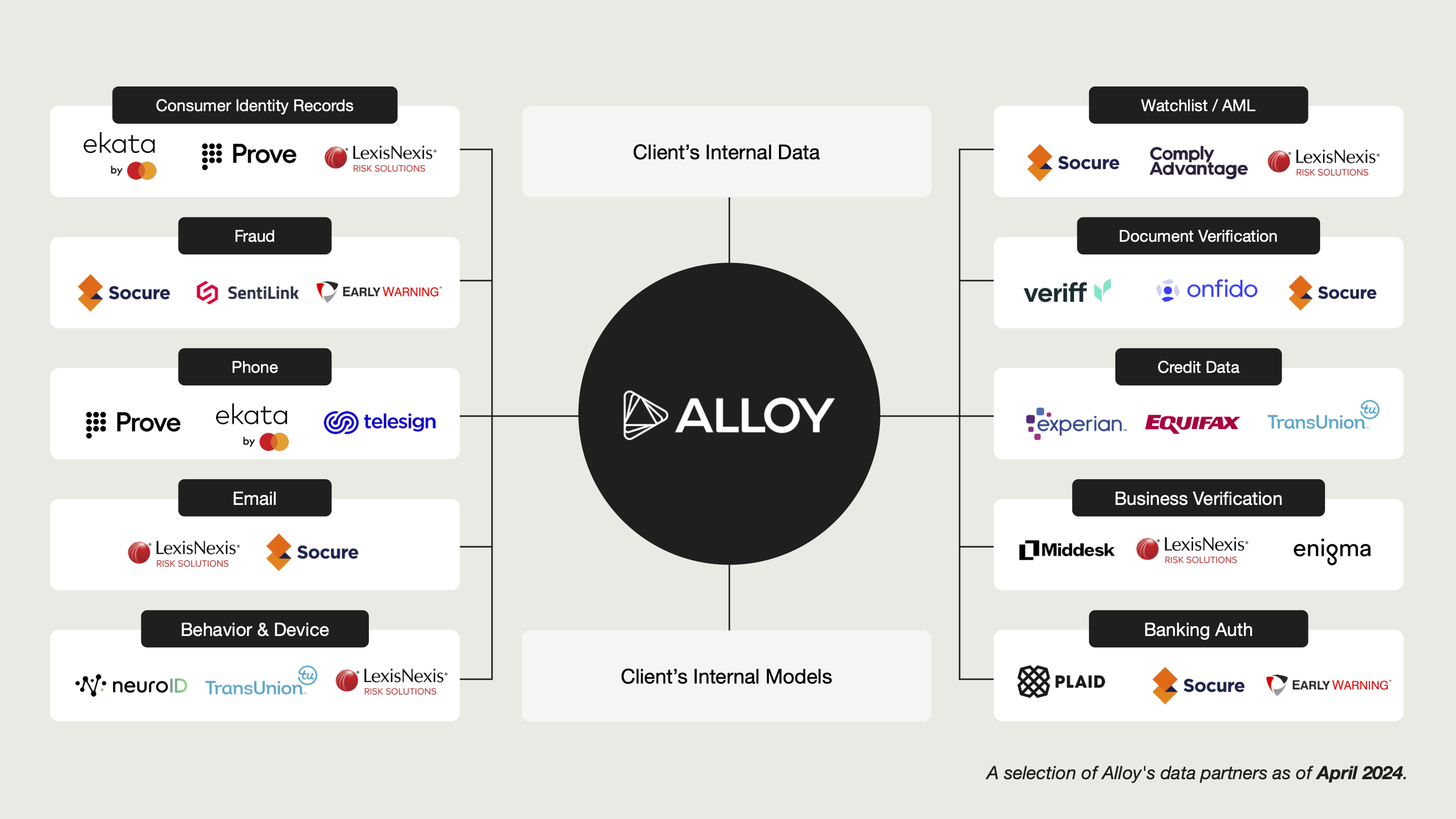Share
There’s no silver bullet for fraud prevention
Apr 18, 2024
Using data orchestration to bring together the broadest network of data vendors and help banks, fintechs, and credit unions keep pace with identity risk
Alloy currently partners with over 60 total data vendors, consisting of over 200 separate integrations with individual data products. From standard data sources, such as social security number lookups and credit scores, to non-traditional ones, like biometric data and cashflow analytics, we’re always keeping an eye on the market and an open line of communication with our clients to identify and assess new data products to add into the mix.
Last year, we averaged 12 new data integrations per quarter — including integrations with Onfido for document verification via Alloy’s SDK, Enigma for KYB, and the major credit bureaus for traditional credit data in global markets.
Every data product offered by Alloy is covered with robust bilateral agreements with the provider, whereas other companies often only have marketing rights without a formal integration agreement — or no formal relationship at all — with the data vendor.
Our sizable network of data partners has long been one of our top differentiating factors. At the same time, sometimes (prospective) clients can find the breadth of options a bit daunting. They may come to us with only 3 - 5 data integrations in mind, and ask, “Why do I need the other 55?” I’m here to demystify this a bit for you.

Why does Alloy integrate with a broad spectrum of data sources?
Alloy was founded in 2015 with the idea that if banks, fintechs, and credit unions have access to more data, they can confidently make better decisions about a customer’s identity risk. Back then, most organizations would build one-to-one integrations with data vendors instead of using a platform like Alloy. This approach proved to be a time-consuming and costly endeavor. They also had to manage each integration on an individual, ongoing basis creating a recurring burden and distraction for involved resources like developers.
Alloy set out to solve this problem by leveraging data orchestration to provide banks, fintechs, and credit unions access to best-in-class data vendors using a single integrated platform. Alloy’s data orchestration capabilities enable clients to make the most informed decisions by running multiple data sources from different vendors simultaneously in an integrated way and synthesizing the data to paint a clearer picture of customer risk.
Why should banks and fintechs use orchestration platforms to review customer identity and risk?
Using more than one data source for verifying customer identity and predicting customer risk is important because it ultimately allows banks, fintechs, and credit unions to accept more good customers.
For example, let’s say you use Data Vendor A to verify an applicant’s address. When an applicant who just moved a few weeks ago is applying for an account with you, Data Vendor A denies them because it does not have their new address on file yet. That is a possibly good customer you excluded because you did not have more data to make a more informed decision.
Now, let’s say you use a data orchestration platform to run your standard check on them with Data Vendor A, but at the same time, you’re running a check with Data Vendor B, a data vendor that looks at their utility bill history. Their utility bill history shows that last month, the applicant switched their electricity bill over to the new address listed on their application. You can now approve this customer because you can reasonably infer they recently moved.
Building integrations with multiple point solutions vs. installing a data orchestration platform
In-house identity risk platforms are not easy to build. Before getting started with the building process your team would need to go through the process of selecting the appropriate data solutions that cover your needs. This step alone could take months or years, depending on your internal processes, managing the hurdles of contractual negotiation, and third-party due diligence. From there, not only do you need to build out the initial integration with your selected data vendors but then you also must maintain those integrations on an ongoing basis.
Every time the vendor makes a product enhancement or adds a new feature, it could affect your integration. Most banks, fintechs, and credit unions simply don’t have the bandwidth to build and maintain their data integrations, putting them at risk of using outdated information and processes.
There’s no silver bullet for fraud prevention. As fraud and compliance landscapes continue to evolve, it’s critical that your risk management programs are nimble enough to evolve with recent trends. What works for you today, may not work for you next month or next year. That’s why a tool like Alloy, which brings all of these point solutions into a single platform, is so valuable. Without a data orchestration platform like Alloy, whenever you want to try out a new data vendor, that’s another integration that you need to build and maintain.
Alloy’s clients tap into more than just 200+ data sources
Alloy is constantly evaluating new data vendors and developing new partnerships with vendors to keep our clients on the cutting edge. Not only do we keep an open feedback loop with our clients to hear about the solutions that they want, but we’re always communicating with our peers in the identity space to predict where fraud is going and make sure we’re staying ahead. Alloy is a centralized technology partner that nearly 600 financial institutions depend on because:
We recognize that customer experience is invaluable. Alloy helps banks and fintechs close the gap between risk management and customer experience — from account opening throughout the entire customer lifecycle. With our ability to detect fraud throughout the customer lifecycle, we help banks know when to introduce friction in the right way at the right time without compromising customer experience.
Time is not an infinite resource. The Alloy team has tackled hundreds of integrations with data providers – we’ve seen (almost) everything. Our team applies our combined experience to power through new integrations to make data readily available in one place – not to mention how easily accessible it is through our codeless SDK. As a result, we save clients valuable engineering resources and get them live, faster.
One size doesn’t fit all. Banks and fintechs typically come to Alloy with a couple of data vendors in mind, but they need help filling in the gaps. The breadth of our data integrations enables our team to recommend the right data product regardless of the use case or business line.
You can’t set it and forget it. As fraud continues to evolve, it’s imperative that banks and fintechs stay prepared for the emerging fraud threats. Thanks to our Testing Suite, banks and fintechs are able to test multiple data sources without carrying the burden of costs, contracts, or additional engineering needs. After testing, it’s as simple as a drag and drop to implement a new data source.
We do the heavy lifting for you. Our team is well-equipped and able to handle the ongoing third-party vendor maintenance, so you don’t have to. Alloy stays up to date on new features and versions of our partners' products. Gone are the days of having to worry about multiple contract renewals and searching for SOC2 and model governance documents – we’ve got you covered.
Much goes into implementing and maintaining one third-party data vendor relationship, let alone over 60. Alloy is an expert at this. With Alloy, banks and fintechs can confidently leave data vendor management to us while they focus on building and improving their core products and services.
Learn more about data orchestration
Datos Insights and Alloy outline the benefits of data orchestration for identity risk management in financial services.



